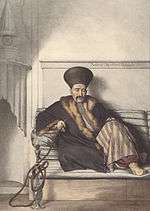Kodjabashis

The kodjabashis (Greek: κοτζαμπάσηδες, kotzabasides; singular κοτζάμπασης, kotzabasis, from Turkish: hocabaṣı) were the local Christian notables in parts of Ottoman Greece, especially the Peloponnese. They were also known in Greek as proestoi (προεστοί, "primates") or demogerontes (δημογέροντες, "village elders"). In some places they were elected, but, especially in the Peloponnese, they soon became a hereditary oligarchy, who exercised considerable influence and held posts in the Ottoman administration.[1] During the Greek War of Independence, the antagonism between the Peloponnesian kodjabashis, who sought to retain their previous preponderance and power, and the military leaders drawn from the klephts, was one of the main driving forces behind the outbreak of the Greek civil wars of 1824–1825, in which the "aristocratic" faction comprising the kodjabashis, the wealthy shipowners of Hydra and the Phanariotes, prevailed.[2]
See also
References
- ↑ Stavrianos, Leften Stavros (2000) [1958]. The Balkans Since 1453. C. Hurst & Co. Publishers. p. 273. ISBN 1850655510.
- ↑ Clogg, Richard (2002). A Concise History of Greece (Revised ed.). Cambridge University Press. pp. 35ff. ISBN 0521004799.